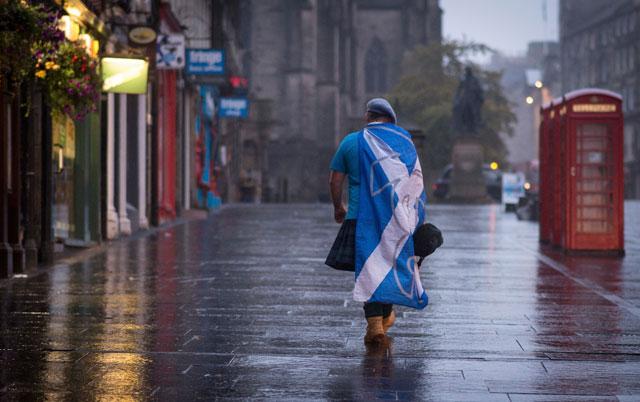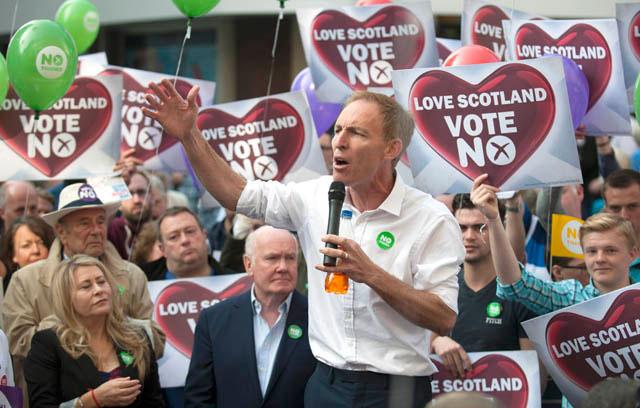You are here
World holds its breath, mostly hoping Scots vote ‘No’
By Reuters - Sep 17,2014 - Last updated at Sep 17,2014

PARIS — The world is holding its breath but mostly hoping Scotland will vote "No" to independence from Britain in Thursday's referendum.
For reasons of self-interest and geopolitics, major powers from Beijing to Washington, and Moscow to New Delhi are quietly praying the United Kingdom holds together and does not create a contagious precedent of state fragmentation in unstable times.
Among London's European Union partners, Germany has said openly it would prefer Britain to stay together while other countries, notably Spain, Belgium and Italy, are hoping the Scottish vote does not create or exacerbate problems for their own national cohesion.
Russia and China, often at loggerheads with Britain in the United Nations Security Council, have strong domestic grounds to avoid wishing for the old imperial nation's discomfiture, since both are keen to stifle separatism at home.
Almost the only groups around the globe rooting for Scottish sovereignty are peoples without a separate state of their own, from Catalans in Spain to Kashmiris in India and Kurds scattered across Turkey, Iraq and Iran, many of whom yearn for self-determination.
The Catalan regional government in Barcelona wants to call its own non-binding independence referendum for November 9, but Spanish Prime Minister Mariano Rajoy on Wednesday described this and the Scottish vote as "a torpedo below the waterline of the European spirit".
The United States has made clear it wants Britain to remain a "strong, robust, united and effective partner", in President Barack Obama's words, while saying it was Scotland's choice.
London has long been Washington's most loyal and willing ally in the NATO defence pact and in military interventions in the Middle East and beyond, although that activism was called into question last year when the British parliament voted against joining proposed air strikes against Syria.
"The US has really hoped it wouldn't need a policy on this and that the independence issue would just go away," said Fiona Hill, a former US National Intelligence Council specialist on Europe now at the Brookings Institution think tank.
"No one really believed it was a possibility until the last few weeks. Now they are really having to start thinking about it," she said.
A large opinion poll lead for opponents of Scottish independence has shrunk dramatically over the summer and the "no" side is now only marginally ahead in most surveys.
US defence officials have aired concerns about the practical complications of dealing with an independent Scotland, which builds Britain's aircraft carriers and hosts its only nuclear submarine base. US diplomats also fear a breakup of the United Kingdom would weaken both parts economically and make a British exit from the EU more likely, weakening Washington's influence inside the bloc.
If Scotland votes to go its own way, Washington will want it in the EU and NATO, Hill said.
Few back independence
Outside the West, there are perhaps surprisingly few countries keen to see Britain break up.
India, a former British colony which won independence in 1947 after a campaign of civil disobedience, might have been expected to have some sympathy with the Scots.
The world's largest democracy with 1.2 billion citizens, India has long pressed for a permanent seat on the UN Security Council alongside the United States, Russia, China, Britain and France. Some critics of the UN system contend that a breakup of Britain, reducing the UK to a rump with fewer than 60 million people, would strengthen the case of aspirants such as India, Brazil, Japan, Indonesia and Nigeria.
But new Foreign Minister Sushma Swaraj blurted out her horror at the thought of New Delhi's former colonial master splitting apart, when questioned at a September 8 news conference.
"A break-up of the UK? God forbid," she responded. "I don't think any such possibility exists at the moment."
After a senior civil servant whispered in her ear, Swaraj corrected herself: "It is up to the people of Scotland to decide."
Secession and independence moves are too sensitive an issue for Russia to encourage, so the standard line from President Vladimir Putin and Foreign Minister Sergei Lavrov has been that Scotland's future is an internal British matter.
Putin rose to power in 2000 by crushing a separatist revolt in the southern region of Chechnya and Moscow continues to have problems with armed secessionists and separatists in the mainly Muslim North Caucasus.
The president spelled out the Kremlin's line on Scotland in January, before Russia's seizure and annexation of Crimea from Ukraine, when a British journalist asked him about the vote.
"It's not our business. This is an internal problem in Britain," he said. "I think any nation has the right to self-determination, and in the Europe of today such an erosion of state sovereignty in the framework of a united Europe is simplified. But still staying within a single, strong state has certain advantages and it should not be forgotten."
Asked if he might invite an independent Scotland to join a Russian-led customs union of former Soviet states, Putin joked: "Yes, I don't exclude such a possibility."
China, which rejects any outside interference over its rule in Tibet or its relationship with Taiwan, has watched the Scottish debate with nervousness and some mystification.
While Beijing has taken no official position, the overseas edition of the official People's Daily wrote this week: "No doubt, this is a lose-lose situation for both parties."
Taiwan, the self-ruled island of 23 million people that China claims at its own, and where many citizens would like their own formal declaration of independence, has been watching Scotland closely.
"The referendum is a demonstration of democratic behaviour and procedure and it is a world value that the future of a place is determined by its residents," said Ketty Chen, an official of Taiwan's opposition Democratic Progressive Party.
Scottish independence campaigners have cited Norway, a prosperous Nordic oil and gas producer with a generous welfare state, as a role model for their countries.
But Norwegians — whose country split from a union with Sweden early in the 20th century — see limits to the parallels and some are warning the Scots against miscalculation.
"It is very different to go out of a union you have been in for such a long time as Scotland has with Britain, with the integrated economy, systems and agreements," Norwegian Prime Minister Erna Solberg told Reuters. "I have no recommendation to the Scots on this, but I see it as a big project they are getting into with a very high degree of uncertainty," she said.
Related Articles
Having rejected independence and lost First Minister Alex Salmond, Scotland woke up to an unsettled future Saturday as fears grew that new powers promised by London will prove a disappointment.
Thousands of members of the Protestant Orange order marched through Edinburgh on Saturday in a show of strength against Scottish independence, as campaigning ahead of the referendum entered its final weekend.
BRIDGE OF ALLAN, United Kingdom — Sonja Cameron's team of canvassers has been out on the streets of Bridge of Allan twice a week sinc
















